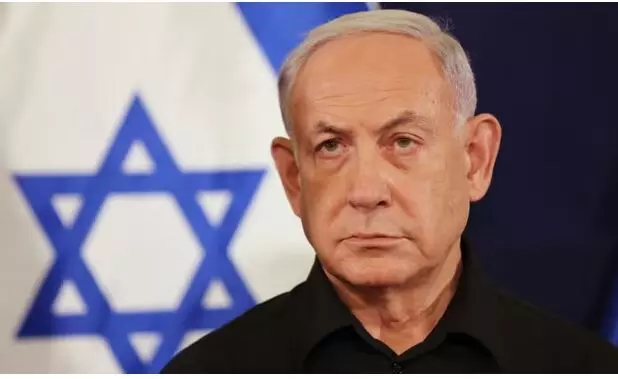
Afraid of being removed after war, Netanyahu reluctant to end the war: Report
text_fieldsAmid intensified ground offensive by the Israeli forces in the Gaza Strip with extended military operations in the densely populated urban refugee camps in the central part of the territory, reports suggest that Prime Minister Benjamin Netanyahu ignored requests to discuss the post-war control of the Gaza Strip.
The indiscriminate bombardment on Gaza since Hamas' October attack has so far claimed the lives of more than 23,000 Palestinians, including women and children, most of whom sought refuge in the UN and Israeli-designated refugee camps and centres.
Israeli security officials, including the directors of Mossad, Shin Bet, the IDF chief of staff, and the defence ministry, have made three unsuccessful requests for a meeting with the prime minister to discuss decisions for the "day after" Israel declares its goals against Hamas achieved, according to reports from Israel’s Channel 12.
The refusal has sparked concerns among security officials about the need to make timely decisions regarding the future of Gaza, both internally and about external actors, as pressure mounts from the international community.
Allegations in the Israeli media suggest that Netanyahu and Defense Minister Yoav Gallant have also rejected discussions on transitioning from the current high-intensity stage of fighting to a more precise targeting of Hamas leaders. This hesitation is attributed to concerns about the potential destabilization of Netanyahu's far-right coalition government, which faces dissolution after the conflict ends.
In his first interview since the hostilities broke out, Palestinian Authority President Mahmoud Abbas condemned the war as "beyond a catastrophe" and accused Netanyahu of planning "to get rid of the Palestinians." The humanitarian crisis in Gaza has escalated in recent days, with thousands of Palestinian families fleeing heavily targeted areas, and setting up tents in the streets of Deir al-Balah.
The situation on the ground in Gaza is dire, with reports of broadened offensives into overcrowded refugee camps, house-to-house fighting in the north, and heavy airstrikes on southern towns. The health authority in the Hamas-run strip reported over 200 casualties in the last 24 hours alone.
Despite growing international outcry and criticism, including from the U.S., Israel's most important ally, Netanyahu has reiterated his commitment to push on until "complete victory" over Hamas. Divisions within the Biden administration over Israel policy have surfaced, with some officials expressing concerns about perceived hypocrisy in the global south over Israeli actions.
In a move to address the humanitarian crisis, the UN has appointed Sigrid Kaag, the Netherlands' outgoing finance minister, as aid coordinator to the Palestinian territory. However, aid delivery remains insufficient, with only about 200 trucks a day entering Gaza, compared to the 500 that entered before the conflict.
The war in Gaza is not only intensifying regional tensions but also showing signs of dangerous escalation. In the occupied West Bank, Israeli forces killed at least six Palestinians in an overnight raid, bringing the total casualties in the territory to 300. Meanwhile, Israel and the Iran-backed Lebanese group Hezbollah continue to exchange near-daily volleys of missiles, airstrikes, and shelling.
Behind the scenes, the U.S. is leading intense negotiations to de-escalate hostilities on the Blue Line, separating Israel and Lebanon. The risk of miscalculation setting off a regional war involving Iran and its proxies in Lebanon, Syria, Iraq, and Yemen remains a significant concern.























